Chapter 7 International Date Line
Chapter 7 International Date Line
Textbook Questions and Answers
1. Two boxes in different hemispheres are given in the following diagram. The IDL passes through both the boxes. In one box, the meridian, day and date is given. Find the day and date for the other box.
Answer:

2. Select the correct option :
Question 1.
While crossing the IDL, a person will have to add one day when traveling from
(a) East to West
(b) West to East
(c) South to North
(d) North to South
Answer:
(a) East to West
Question 2.
If it is Wednesday 10 a.m. at 150 E meridian, then what will be the time at IDL?
(a) Wednesday at 6 a.m.
(b) Wednesday 9 p.m.
(c) Thursday 2 p.m.
(d) Thursday at 6 p.m.
Answer:
(b) Wednesday 9 p.m.
Question 3.
According to the international convention, at which meridian does the day and date change occurs?
(a) 0°
(b) 90° E
(c) 90° W
(d) 180°
Answer:
(d) 180°
Question 4.
At which direction of the IDL does a new day start immediately?
(a) East
(b) West
(c) North
(d) South
Answer:
(b) West
Question 5.
IDL brings coordination in which of the following?
(a) GPS system
(b) Defence departments
(c) Transportation schedules
(d) Determining the hemisphere
Answer:
(c) Transportation schedules
3. Give geographical reasons
Question 1.
IDL is proving to be very useful in today’s times
Answer:
IDL is proving to be very useful in today’s times because:
- The IDL brings coordination between international airlines, transportation services, economic and trade activities.
- The IDL has been carved out of the necessity of coordinating time and date.
- It is also important in today’s modern era and rapidly happening global developments.
- We can keep a track of all the calculations of a day and time accurately with the help of IDL in case of global transportation especially, with respect to airways.
- It is only because of the IDL that the schedules of the traffic worldwide are organised properly.
Question 2.
The day starts in the Pacific Ocean on the earth
Answer:
- The IDL passes through the Pacific Ocean.
- With reference to the IDL, the day on Earth starts in the West and ends in the East.
- It is one and the same day only at 12 o’clock midnight at the 180° meridian.
- For the countries lying to the east of it i.e. the USA, Chile, etc., it is the end of the day while for the countries lying to the west of it i.e. Japan, Australia, etc. it is the start of a new day.
Thus, a new day starts in the Pacific Ocean on Earth.
4. Write in brief:
Question 1.
What considerations have been made while deciding the IDL?
Answer:
The following points were taken into consideration while drawing the International Date Line. (IDL):
1. The direction of travel
2. The current day and date
- Accordingly, while traveling from East to West of IDL, a day is added. For example, while travelling from America to Japan, if it is Thursday 25th December, then it will be Friday 26th December in Japan.
- While from West to East of IDL, the day remains the same. For example, while travelling from Japan to America, if it is Thursday 25th December, then Thursday 25th December, only should be considered.
Question 2.
While crossing the IDL, what changes will you make?
Answer:
- When you cross the 180° meridian, some precautions need to be taken.
- There is a difference of 12 hours from Prime Meridian, if you go from East or West.
- According to the convention, the start (and end) of a date is considered to be at 180° Meridian.
- Accordingly, an adjustment or change in day and time is made. Thus, while travelling from east to west of IDL , a day is added whereas while travelling from west to east of IDL, the day remains the same.
Question 3.
Why is the IDL not a straight line like the 1800 meridian?
Answer:
- Attempt has been made to make the IDL pass through the Pacific Ocean completely.
- Had it passed through a land or some islands, the people there would have had to follow different dates and timings because dates would have been different on their Eastern and Western parts.
- Also, it would have been difficult to know when one crosses the IDL on land, and when the date changes on the calendar.
- Therefore, the IDL is not a straight line like the 1 180° Meridian. At places, it turns East while at other places, it turns West.
Question 4.
Why doesn’t the IDL pass through land?
Answer:
- If the IDL had passed through a land or some islands, the people there would have had to follow different dates and timings because dates would have been different on their Eastern and Western parts.
- Also, it would have been difficult to know when one crosses the IDL on land and when the date changes on the calendar.
- Hence, the IDL does not pass through land
Question 5.
Why is the IDL considered with respect to the 1800 meridian only?
Answer:
- Our 24-hour day starts at 12 midnight. Because of the earth’s rotation, the midnight occurs at different times, at different places.
- As the Earth is spherical in shape, every place has a place to its East.
- So, it was necessary to determine at what location to the East does the day start on Earth.
- Hence, representatives of many nations got together, under the leadership of an American Professor, Davidson, in the year 1884 and decided the International Date Line.
- The line was drawn opposite to the Greenwich Prime Meridian i.e. with reference to the 180° Meridian.
5. Using an atlas, tell in which of the following routes the IDL will be crossed and show them on the map.
(1) Mumbai- London- New York- Los Angeles- Tokyo
(2) Delhi- Kolkata- Singapore- Melbourne
(3) Kolkata- Hong Kong- Tokyo- San Francisco
(4) Chennai-Singapore- Tokyo- Sydney-Santiago
(5) Delhi-London-New York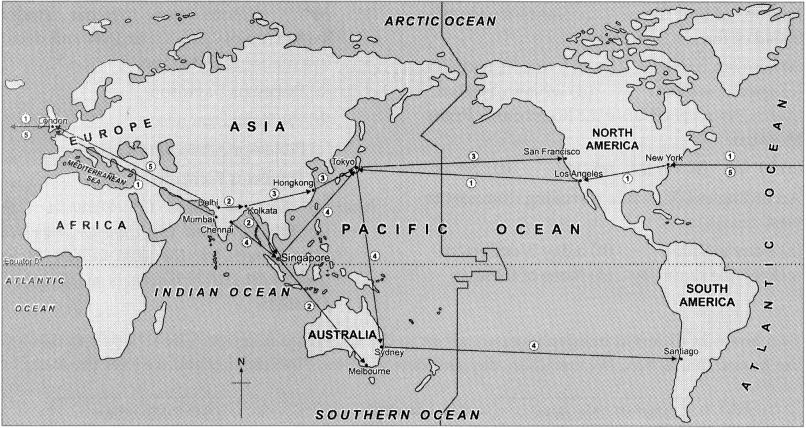
Answer:
(1) Mumbai – London – New York – Los Angeles – Tokyo – IDL will be crossed.
(2) Delhi – Kolkata – Singapore – Melbourne – IDL will not be crossed
(3) Kolkata – Hong Kong – Tokyo – San Fransico – IDL will be crossed.
(4) Chennai – Singapore – Tokyo – Sydney – Santiago – IDL will be crossed
(5) Delhi – London – New York – IDL will not be crossed.
Intext Questions and Answers
Use your Brain Power:
Question 1.
You are traveling from the Kamchatka Peninsula (in the northern hemisphere) to New Zealand (in the southern hemisphere) along the IDL. It is Monday, 22nd June in the northern hemisphere. What will the day and date in the southern hemisphere?
Answer:
The day will be Monday, 22nd June as we are not crossing the IDL.
Examine a ticket of UA 876 Boeing 787-9 Dreamliner closely and find the answers to the following questions:
Question 1.
From which country will the plane take off and where will it go?
Answer:
The plane will take off from Tokyo (Japan) and will go to San Francisco, California (USA)
Question 2.
What is the duration of the flight?
Answer:
The duration of the flight is 9hrs and 15 min.
Question 3.
What is the day, date and time given at the starting point and destination of the flight?
Answer:
At the starting point of Tokyo (Japan) it is Friday, 1st April 12.30 am and at the destination of San Francisco California (USA) it will arrive on Thursday March 31st at 5.45 pm.
Question 4.
What special note is given on the air ticket?
Answer:
A special note on the ticket states that the flight involves a date change.
Question 5.
What could be the reason behind giving such a note?
Answer:
The reason behind giving such a note is to make us understand that the flight will cross the IDL
Question 6.
During this flight, will the plane cross the IDL? If yes, then from which direction to which direction?
Answer:
During this flight, the plane will cross the IDL from west to east.
Question 7.
What did you understand by reading the ticket?
Answer:
We understand that a day is deducted and the time is fixed backward by 1 day while crossing the IDL from west to east.
Try this:
Question 1.
Complete the following table to understand the time at different meridians: (In this activity we are not taking into consideration the rotation of the earth.)
Answer:
- All places to east of Prime Meridian are ahead of GMT and all places to west of Prime Meridian are behind GMT.
- Earth rotates on its axis and covers 1° longitude in 4 minutes.
- As Sunil is moving 30° east, time will move ahead by 120 min, i.e. 2 hours (30° x 4 min.) and as Minal is moving 30° west, time will move backwards by 120 min. i.e. 2 hours.
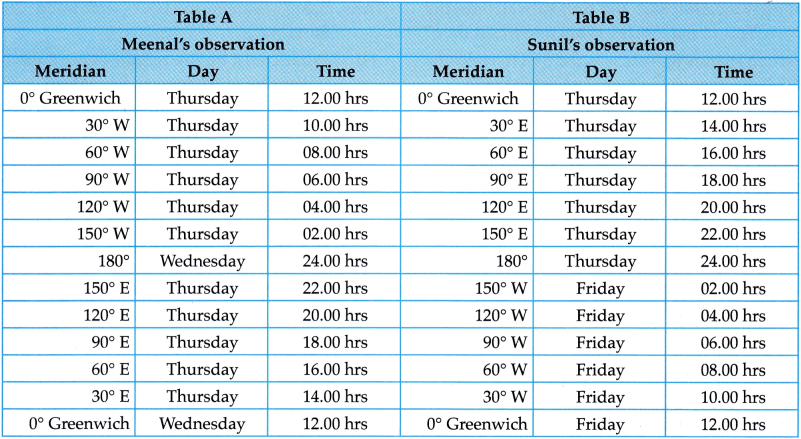
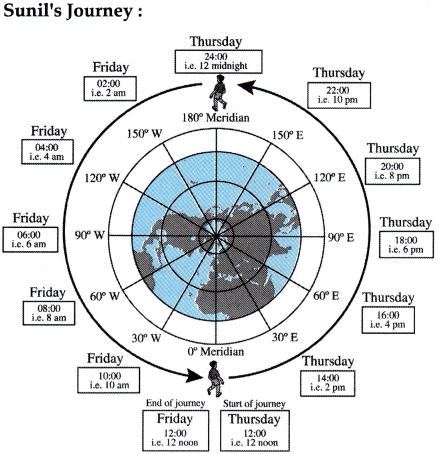
Question 1.
What is the day at 00 meridians at Greenwich after completing the table ‘A’?
Answer:
The day at 0° meridian at Greenwich after completing the table ‘A’ is Wednesday.
Question 2.
What is the day at 00 meridians at Greenwich after completing the table ‘B’?
Answer:
The day at 0° meridian at Greenwich after completing the table B is Friday.
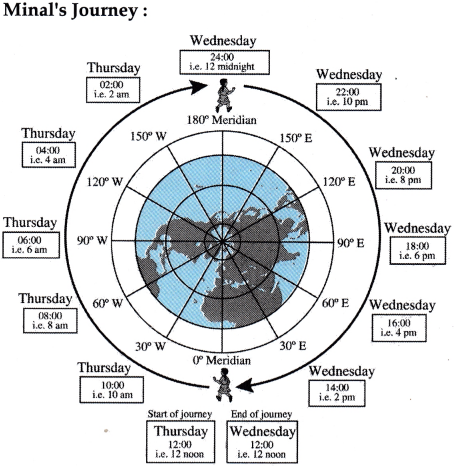
Question 3.
Though both were at the same place, why were they experiencing different days? How did this happen?
Answer:
Because Sunil was moving eastward, so time will move ahead whereas Meenal was moving westward, so time is moving backward.
Question 4.
How many days occurred while doing this activity? Name them.
Answer:
While doing this activity, 3 days came in reference as Wednesday, Thurday and Friday.
Question 5.
Which day is correct: Wednesday in Table ‘A’ or Friday in Table ‘B’? Why?
Answer:
None of the given days are correct. The correct day is Thursday after considering IDL.
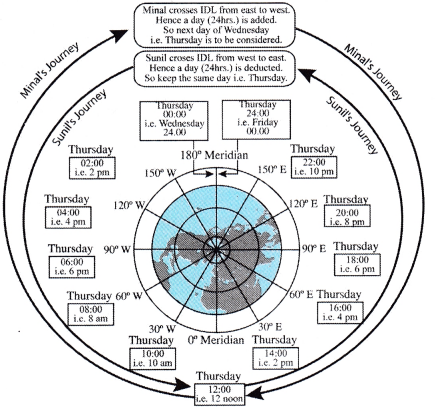
Explanation:
(i) When Sunil reached 180° meridian i.e. IDL, according to him it is Thursday midnight (24.00). When IDL is crossed from west to east we need to deduct a day (24 hrs.). Thus when 24 hrs are deducted from Thursday 24.00 (midnight) we get Thursday 00.00. So after crossing the IDL the day to be considered is Thursday i.e. the same day.
(ii) When Minal reached 180° meridian i.e. IDL, according to her it is Wednesday midnight (24.00). When IDL is crossed from east to west we need to add a day (24 hrs.). Thus when 24 hrs are added to Wednesday 24.00 (midnight) we get Thursday 24.00 (midnight). So after crossing the IDL the day to be considered is Thursday.
Give it a try:
Your are now aware of the changes required to be made while crossing the ¡DL. Now redo the activity given on Page 59. Tell us the changes that you will have to make while crossing the IDL i.e. 1800 meridian. Your travel will start on Sunday, 21st May 2016 at 10 a.m.
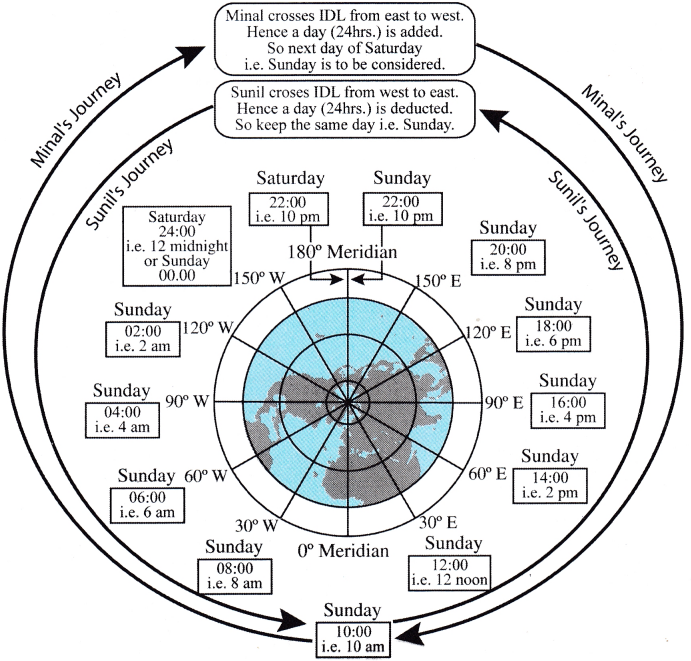
Let’s Recall:
Question 1.
Which meridian is used to determine world standard Time (GMT)?
Answer:
World Standard Time (GMT) is determined using Prime Meridian at 0° longitude.
Question 2.
Which meridian determines Indian Standard Time (1ST)?
Answer:
82°30′ E is the standard meridian of India.
Question 3.
What is the time difference between the GMT and the IST?
Answer:
IST is 5hrs and 30 min ahead of GMT.
Additional Important Questions and Answers
Complete the Statements choosing correct option:
Question 1.
Man has studied the rotation speed, direction and shape of the earth and prepared the system.
(a) monometric
(b) chronometric
(c) topographic
(d) GIS
Answer:
(b) Chronometric
Question 2.
Earth rotates from
(a) north to south
(b) south to north
(c) east to west
(d) west to east
Answer:
(d) west to east
Question 3.
In terms of time the part of the earth is ahead of the part.
(a) northern, southern
(b) southern, northern
(c) eastern, western
(d) western, eastern
Answer:
(c) eastern, western
Question 4.
is reached after 12 hours from Prime Meridian
(a) 90° W
(b) 90° E
(c) 180°
(d)120°W
Answer:
(c) 180°
Question 5.
According to IDL, while traveling from east to west
(a) a day is added
(b) a day is deducted
(c) keep the same day
(d) None of these
Answer:
(a) a day is added
Question 6.
Many nations got together under the leadership of in 1884 and decided on International Date Line.
(a) Professor Davidson
(b) Professor Samuelson
(c) Professor Adam Smith
(d) Professor Richardson
Answer:
(a) Professor Davidson
Answer in one sentence:
Question 1.
If it is 12noon at the Prime Meridian then what will be the time at 60°E longitude?
Answer:
If its is 12noon at the Prime Meridian, then it will be 16.00hrs (4pm) at 60°E longitude.
Question 2.
Which part of the earth is ahead in terms of time?
Answer:
In terms of time the eastern part of the earth is ahead of the western part.
Question 3.
When was it decided to draw the International Date line?
Answer:
When representatives of many nations got together under the leadership of American professor Davidson in the year of 1884 they decided on the International Date line.
Question 4.
A new day starts on the earth in which Ocean?
Answer:
A new day starts in the Pacific Ocean on the earth.
The following table shows the days and time to welcome New Year in different countries and cities according to 1ST. Observe the table and answer the questions gives below:
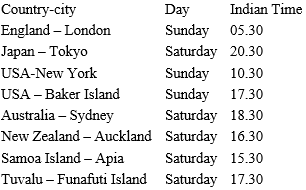
Question 1.
Which location was the first to welcome the New Year in the World? What day was it then?
Answer:
Samoa islands in Apia was the first to welcome the New Year in the world on Saturday.
Question 2.
Which location bid farewell to the year 2016, the last of all?
Answer:
Baker islands in USA was last to bid farewell to the year 2016.
Question 3.
On which day did that location welcome 2017?
Answer:
Baker islands in USA welcomed 2017 on Sunday.
Question 4.
What could be the reason behind the change in the day of Sydney and London?
Answer:
According to 1ST, India welcomed the New Year at 12 midnight on Saturday. Sydney being 5 hours and 30 minutes ahead of IST and has already welcomed the New year before India on Saturday itself. But London is 5 hours and 30 minutes behind IST will welcome the New Year the next day i.e. on Sunday.